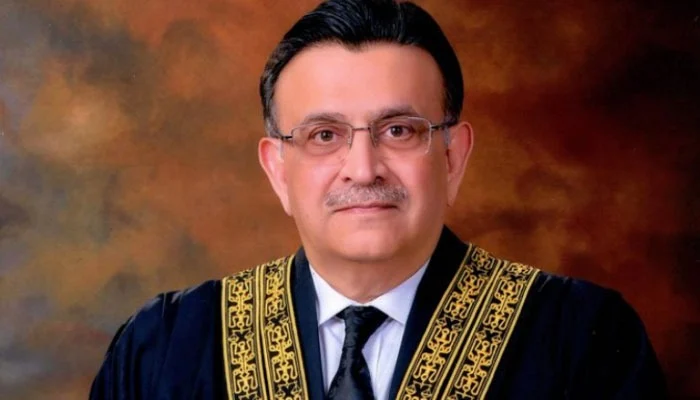ISLAMABAD, July 25(ABC): As the Supreme Court of Pakistan (SC) Monday resumed the hearing for the case of the Punjab chief minister’s election, Chief Justice of Pakistan Umar Ata Bandial said that the court needs more legal clarification regarding the formation of a full bench to issue a verdict on the case.
The CJP also said that he was unsure whether the decision on the said ruling will be made today. Meanwhile, the court also accepted the petition filed by PML-Q President Chaudhry Shujaat Hussain and the PPP to become a party in the case.
During the hearing, Deputy Speaker Mazari’s lawyer, Irfan Qadir said he was instructed to speak regarding the formation of the full court only; therefore, he needed time to take instructions from his client.
Meanwhile, Hamza Shahbaz’s counsellor Mansoor Awan sought time to take instructions for arguments on merit.
Justice Ijazul Ahsan reiterated that the decision to form a full court will be made on merit. Meanwhile, Law Minister Azam Nazeer Tarrar asserted that there was enough clarification in this regard.
Advocate Qadir said he was instructed to speak regarding the full court formation only; therefore, he needs time to take instructions from his client.
Meanwhile, Hamza Shahbaz’s counsellor Mansoor Awan sought time to take instructions for arguments on merit.
Justice Ahsan reiterated that the decision to form a full court will be taken on merit; meanwhile, Law Minister Azam Nazeer Tarrar asserted that there is enough clarification in this regard.
Tarrar added that if the review petition is approved that there will be no need for a run-off election.
During the hearing, CJP Bandial said that the case regarding the National Reconciliation Ordinance (NRO) was heard by a full court because it was a “constitutional matter”.
“We have sent the prime minister home with five judges at that time you [coalition parties] were celebrating and now you are standing against this,” the chief justice said, adding that if this matter crosses the limit, then a full court will be formed.
Presenting his arguments, advocate Qadir added that when allegations are levelled against the judges that similar bench is formed repeatedly then these charges can be rejected by the formation of a full court.
“There is no objection on the neutrality of the current three-member bench; however, to remove any ambiguities, a full court needs to be formed,” the deputy speaker’s counsellor said.
CJP Bandial recalled that the SC had taken suo moto notice in the case of the federal government and announced its verdict by hearing the case day and night.
“In the federal government case, we were of the view that the National Assembly deputy speaker had violated Article 95; however, under the current scenario, the court hasn’t taken suo moto notice,” the chief justice said.
He further added that instead of prolonging the case, it can be shortened, saying there was only one question to be addressed: whether the party head could give directions or not.
“You have already given the answer to this question in affirmative,” he told advocate Qadir.
Continuing his argument, advocate Qadir said that the re-election for the chief minister was held in the light of the court’s decisions.
“Therefore, if the court refuses to accept the deputy speaker’s decision to reject the votes of defecting members, there will be no need for re-election,” he said, adding that the basis of this case is the Supreme Court’s verdict “which must be reviewed first.”
Advocate Qadir further said that there is a contradiction in Supreme Court’s ruling on Article 63(A), “which gives the idea that the apex court is under pressure.”
However, he immediately added that he wasn’t trying to disrespect the court as the top court was equally respectable for him as well.
Citing an example of the difference of opinions among politicians which was wreaking havoc on the country, the deputy speaker’s counsel said that if the judges also unite and form a full court, then the issue can be resolved easily.
While concluding his arguments, the lawyer urged the court not to hurry in making a decision and carefully deliberate it.

